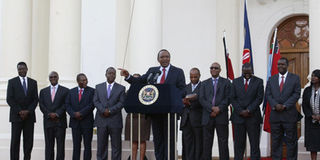Uhuru takes graft fight to State House

President Uhuru Kenyatta and his cabinet. PHOTO | EVANS HABIL
What you need to know:
- Harambee House hosts the office of Interior and Coordination ministry, under Cabinet Secretary Joseph ole Lenku, Interior Principal Secretary Mr Mutea Iringo and Coordination Principal Secretary Josepheta Mukobe.
- Mr Kenyatta told police chiefs and county administrators in Nairobi that the people at Harambee House are the reason key services cannot be delivered to the public despite millions of money being pumped in.
When the President talked about corruption in his office on Thursday, the spotlight was turned on top officials at Harambee and State Houses.
Harambee House hosts the office of Interior and Coordination ministry, under Cabinet Secretary Joseph ole Lenku, Interior Principal Secretary Mr Mutea Iringo and Coordination Principal Secretary Josepheta Mukobe.
Also in the Office of the President but stationed at State House are Secretary to the Cabinet Francis Kimemia and State House comptroller Lawrence Lenayapa.
According to those in the know, the President is upset that the corruption enterprise has trickled to county commissioners and top officers in the Police Service impeding development.
Three months ago, the President’s speech writer Eric Ng’eno alluded to the existence of a parallel government which was resisting change initiated by the Jubilee government.
This parallel government, he said was inherited from the Kibaki government and at one time was used to battle former Prime Minister Raila Odinga in the last Coalition government.
However, we may never know who the President had in mind when on Friday he admitted that the fight against corruption should start with cleaning up the mess in his own office.
CORRUPT TOP DOGS
Mr Kenyatta told police chiefs and county administrators in Nairobi that the people at Harambee House are the reason key services cannot be delivered to the public despite millions of money being pumped in.
“When I address the issue of corruption, I’m not necessarily addressing the small officer. They take (bribes) because their seniors take. And I want us to agree on this, starting with my own officers here: There are officers in there who think the office is for making money,” he said.
“If you have been given that responsibility, that budget is not supposed to be shared between you and your friends. That budget is supposed to ensure that the policemen have the vehicles they require, the equipment they require to do their work. That is what that money is there for.
He went on, jumping between English and Kiswahili: “That money is there to ensure that there is fuel in cars.
“If you have been given that responsibility, that budget is not for you to share with your friends. We must bring it to an end. Na watu wajipange (people should be prepared) because they will see something very soon.”
The President named no names, but a direct jibe at his office brings out the frustration he has seen ever since he took power. In just under nine months; there has been at least a scandal every two months.
There has been the controversial tenders on the airport expansion project, repair works on the deputy presidential house in Karen, Airport fire last August, a controversial security tender and recently, multi-billion railways tender.
WRONG STRATEGY
And in a civil service where the culture of “eating” has been deep-rooted, Mr Kenyatta conceded that going for the junior officers whether in the police or anywhere else whenever they take a bribe is wrong strategy. This is because, he argued, the juniors are working in an environment where the seniors take bigger bribes.
“We must now say no to this. We must focus ourselves to service delivery. I can speak with confidence that a majority of men and women in our offices do not partake in this. But the few that do it must recognise that their time is up.”
Yesterday, the Consumer Federation of Kenya, a local lobby group, welcomed the admission by the president, but added that it should not be a public relations move.
“By admitting to this obvious fact, the president did a good thing, but he has been a little casual about a serious issue in government. If he is aware now that his officers are corrupt, then he should give an indication that he will punish them,” said Cofek Secretary-General Stephen Mutoro.
“It is now time to allow watchdogs like Parliament to come in. Otherwise this statement may not add any fuel in terms of fighting corruption.”
The President’s office has come under direct scrutiny over the controversial revival of a security tender for the installation of security cameras and communication equipment for the police. Officers at Harambee House were also accused of having a hand in frustrating the standard gauge railway by demanding kick-backs from tenderers.
Last month, Mr Kenyatta had to call for a press conference to explain the exact figures for the railway construction after politicians and lobby groups charged that its cost had been exaggerated.
Mr Kenyatta explained that the 609 kilometre-long line of the first phase of the project will be built from financial support from the Exim Bank of China to the tune of $1.6 billion in commercial loan and a concessional one of $1.63 billion.
In July last year, the Ethics and Anti-Corruption Commission accused senior government officials of lacking goodwill to fight corruption.




